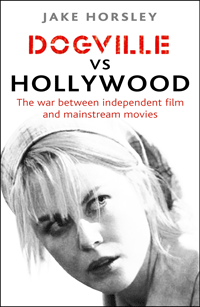
Dogville vs Hollywood
Jake Horsley
The war between independent film and mainstream movies
'Following the history of movies from Méliès to the modern day, Jake Horsley's exhaustively researched, yet light to read, work argues that an 'independent' film is a state of vision and sensibility, rather than how much wonga is thrown at an artiste.' **** Total Film
'Horsley's prose overflows with vitriol and colorful personal take-downs. To wit: Star Wars writer/director George Lucas "can no longer be considered human in the usual sense," while Steven Spielberg "lacks the intelligence for making observations...about the 'heart of man,'" "auteur lite" Kevin Smith's Clerks is "an all-round 'bad' movie with nothing going for it save its bawdy, irreverent humor and a complete indifference to credentials (of which it had none)" and Raising Arizona was "a movie about a baby co-starring Nicolas Cage's hair."...Readers who watch "films," but not "movies," will want to pick up this rollicking evisceration of Hollywood.' Publishers Weekly
"Hollywood is to filmmakers what a wine press is to grapes: it gets the best out of them, and crushes them in the process." From Dogville vs. Hollywood
Interpreting Lars von Trier’s Dogville as a comment on the Hollywood film industry and the moviegoing process, Jake Horsley discusses the age-old conflict between ‘artistic’ and ‘commercial’ movie-making. He proposes that the term ‘independent’, when applied to film-making, refer to sensibility and vision rather than simply backing or funds.
Can an ‘independent’ film achieve commercial success in Hollywood and still be called independent? Charting the history of independent cinema from early pioneers Orson Welles, Stanley Kubrick, John Cassavetes, and Francis Ford Coppola, through to modern practitioners such as David Lynch, Jim Jarmusch, Quentin Tarantino and Charlie Kaufman, this book provides a much-needed critical analysis of the state of the art of today’s film industry.
Horsley describes how Hollywood, as a corporate body, operates like a living organism that can only ever function to maintain its own livelihood. Just as the medical industry depends on keeping people sick and in need of medicine, for example, Hollywood requires an ever dissatisfied public hungry for movies. It is for this reason that the production of quality art works is antithetical to its greater goals.
Independent cinema, on the other hand, consists of individual artists whose goal is indeed to create unique works of art with which to entertain and inspire the public. Horsley argues that the moment independent cinema becomes organised as a movement, it becomes an extension of Hollywood and begins to serve the exact same ends, those of commerce and not art. Dogville Vs. Hollywood demonstrates why independent filmmakers can never successfully work together to form creative movements, because to do so would be to abandon the very thing that makes them independent: the purity and isolation of their vision.
On the other hand, Horsley's book shows how Hollywood, far from being the enemy of independent filmmakers, is an ideal and necessary proving ground
in which they can develop their talents and test the integrity of their vision. Although the vast majority of filmmakers are assimilated, those who meet the
challenges of the Hollywood system, such as Coppola and Peckinpah, often do their very best work there, even as they are drained of their gifts in the process, like grapes in a wine press.
Jake Horsley is a regular film critic, compulsive writer, screenwriter, and occasional dilettante digital filmmaker, and is currently based somewhere in Latin America.
'For all its fury, Dogville vs Hollywood is in fact a very assured critical evaluation of an art form constantly threatened by the artless - it's hard to imagine a better rough guide to film than Horsley's… Passionate, philosophical, erudite, and sometimes witty, Jake Horsley has produced a book that works on every level' The Leeds Guide
To read an extract from this title click here
Original Paperback
£9.95 380pp
ISBN 0 7145 3117 0
Publication Date: November 2005
